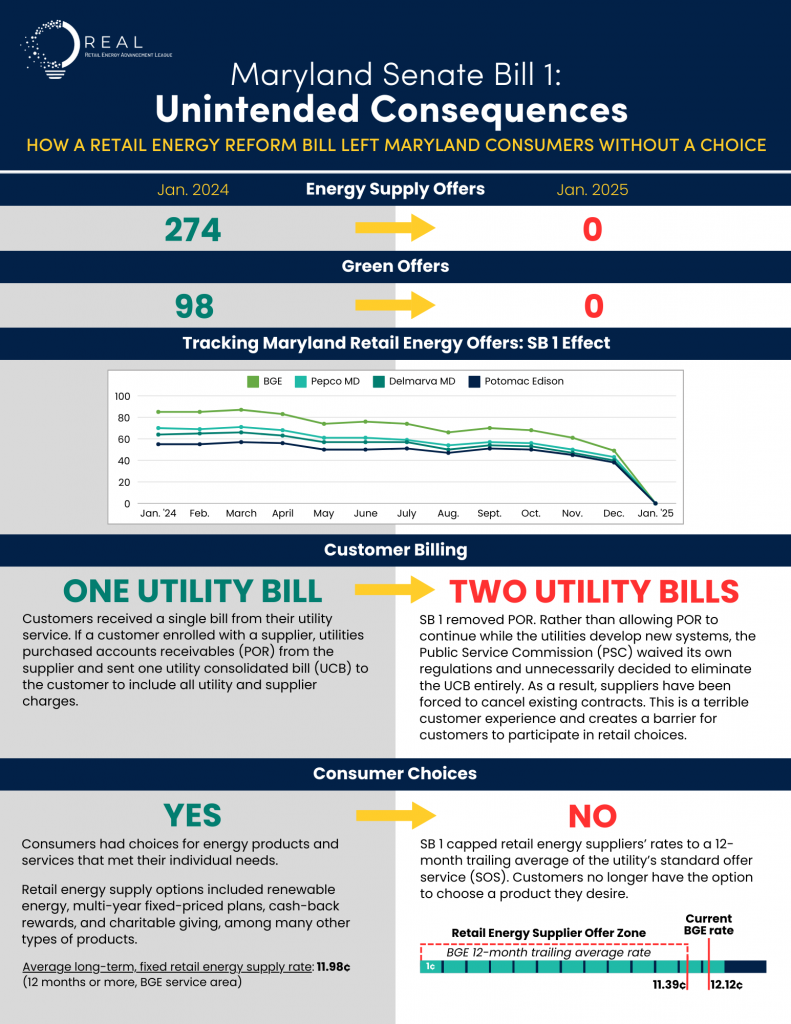In 2024, state legislation was introduced (Senate Bill 1) and signed into law, greatly impacting energy choice options for customers. The interpretation and implementation of that law by the Maryland Public Service Commission in January 2025 created an inoperable market for energy suppliers and a less effective and desirable experience for customers, including prices that are dictated by utility companies and their rates, and the need for customers to receive two different bills. With no retail supply offers, the market shut down. Due to the changes in regulations, retail energy suppliers are required to return customers to the service of their local electric or gas utility. Maryland has now reverted back to a utility monopoly state –– customers no longer have energy options.
The following info sheet offers a comparison between January 2024 and January 2025, demonstrating the market and regulatory changes before and after Senate Bill 1 was implemented. It’s important to note, utility rates aren’t reflective of current or forward market pricing, whereas retail supply offers are. Forcing retail supply offers into a 12-month trailing average limits the ability for suppliers to make offers. Additionally, premium products (e.g. 100% renewable energy) and long-term contracts that offer price stability over multiple years would price higher than a one-year back-dated utility rate average. The new pricing mechanism creates an environment where utility companies can increase rates and retail suppliers are unable to offer alternative options because they are still required to meet the 12-month trailing average.

More than 300,000 residential customers were enrolled annually with a retail electric supplier in Maryland. Customers no longer have options to shop for on the Maryland Electric Choice website. Customers can expect to be notified by the supplier, in accordance with state regulation, that they are being returned to the supply service of their local utility. As customers are transitioned away from their supplier they will notice the supply cost on their bill will adjust to the rate charged by their utility company.


More than 3,000 Maryland residents have reached out to their lawmakers, advocating against the market-closing legislation.
Legislation to fix the market was proposed last year, but the General Assembly did not act on it. At this time, no new legislation has been proposed to reverse the effects of 2024’s Senate Bill 1, which stifled competition and forced providers out of the market.
We encourage you to contact your legislators and share your concerns.
If you haven’t already, please sign up to be a My Energy Choice advocate. You will be alerted when there is an opportunity to advance legislation to fix the market.
The Retail Energy Advancement League (REAL) is advocating for legislative changes that will return energy choice to customers, create energy resilience in Maryland, and deliver a positive customer experience.

REAL filed a lawsuit challenging SB1, which purports to restrain retail energy companies from truthfully marketing their clean energy products to residential customers in Maryland, in violation of the First Amendment to the U.S. Constitution and Maryland state law.
Maryland’s current Renewable Portfolio Standard (RPS) requires both utilities and suppliers to source 36% of the electricity sold in the state with premium renewable energy credits (RECs) from specific types of energy resources and geographic areas. Maryland has not made this a 100% requirement because of the cost and availability of these premium RECs.
Before SB1, retail energy suppliers could market plans as “100% renewable” by obtaining the additional 64% of voluntary RECs from sources anywhere in the U.S. After SB1, retail energy suppliers are prohibited from calling these offerings “100% renewable.”
REAL’s lawsuit explains that the marketing restrictions on renewable energy plans in SB1 are unconstitutional, as REAL’s members use the terms prohibited by statute consistently with the guidance set forth by the EPA and Federal Trade Commission to highlight to consumers the environmental benefits provided by voluntary RECs. SB1 prohibits retail energy suppliers from using words such as “renewable,” “green,” and “clean,” to market and communicate truthful information to customers about how plans with voluntary RECs can help reduce carbon emissions and combat climate change, among other benefits.
The prohibited and compelled speech provisions contained in SB1 violate the First Amendment to the U.S. Constitution and Article 40 of the Maryland Declaration of Rights. These and other restrictions imposed by SB1 will cause irreparable harm by stifling suppliers’ ability to market their products, thus leading to a loss of business and consumer choice in Maryland’s energy market.
REAL continues to litigate this unconstitutional legislative act.